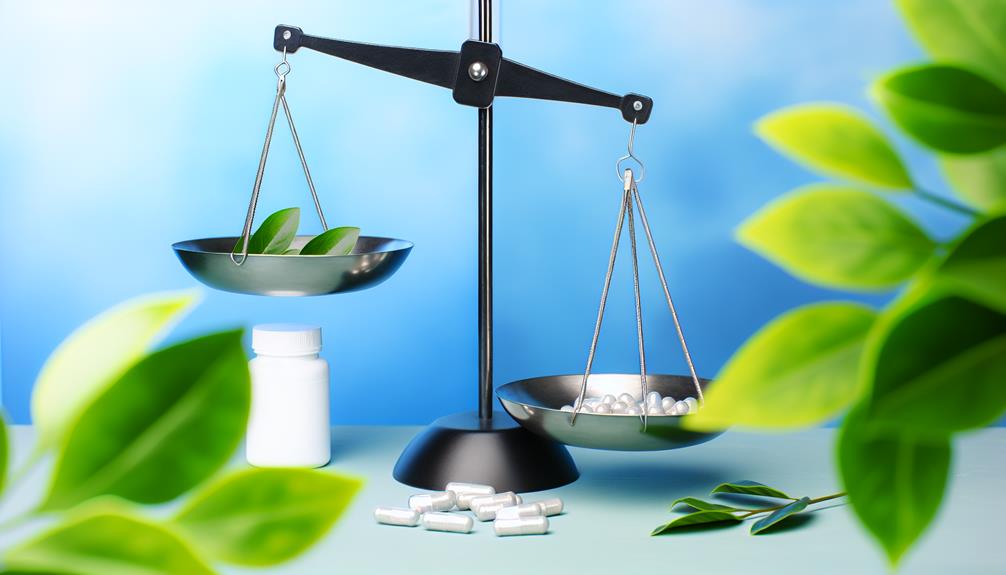DHEA, a key steroid hormone from the adrenal glands, considerably influences men's hormonal health. As I understand it, DHEA levels peak in early adulthood and decline with age, which can impact testosterone production. Supplementing with DHEA can boost testosterone levels, improving physical performance, libido, and energy. Furthermore, it enhances mood and cognitive functions, which is essential for mental well-being. It's important to approach supplementation carefully and consult a healthcare professional for personalized advice. Monitoring hormone levels is imperative to guarantee safety. There's much more to explore, including how DHEA affects muscle recovery and overall vitality.
Understanding DHEA

DHEA, or dehydroepiandrosterone, is a steroid hormone produced by the adrenal glands, and it plays a significant role in the body's hormonal balance. As I explore the subject of DHEA, I find it fascinating how this hormone acts as a precursor to both testosterone and estrogen. Its levels peak in early adulthood and gradually decline with age, which raises questions about its significance in maintaining hormonal equilibrium, especially in men.
I've often encountered DHEA supplements marketed as a way to counteract age-related hormonal decline. While some claim these supplements can enhance well-being, it's essential to approach this topic with a scientific lens. The relationship between DHEA levels and overall health is complex. Research indicates that adequate DHEA levels are associated with improved mood, energy, and immune function, all of which contribute to what I consider a balanced hormonal state.
However, I must emphasize that the use of DHEA supplements isn't universally recommended. I've read studies suggesting that supplementation may not uniformly restore hormonal balance, and in some cases, it could lead to adverse effects. This potential for imbalance highlights the importance of individualized approaches to supplementation and the need for medical guidance. Understanding DHEA's role in hormonal balance is critical for making informed decisions about supplementation—it's not just about boosting levels but ensuring that the body operates effectively.
Impact on Testosterone Levels
The relationship between DHEA and testosterone levels is particularly important, as both hormones are intricately linked in the body's endocrine system. I've found that DHEA supplementation can play a key role in supporting testosterone synthesis, especially as men age. As we understand, testosterone levels naturally decline with age, which can lead to various health issues.
Research suggests that DHEA serves as a precursor to testosterone production. When I consider the mechanisms involved, it becomes clear that adequate DHEA levels are necessary for the best functioning of the testes, where testosterone is primarily produced. In practice, supplementing with DHEA may help replenish dwindling hormone levels, thereby potentially enhancing testosterone synthesis.
Several studies indicate that men who engage in DHEA supplementation often experience an increase in testosterone levels. This increase might not only contribute to improved physical performance but can also enhance libido and overall energy. However, it's essential to note that results can vary greatly from one individual to another, depending on factors like baseline hormone levels, age, and overall health status.
While I'm enthusiastic about the potential benefits of DHEA, I also emphasize the importance of approaching supplementation with caution. Consulting a healthcare provider is important to monitor hormone levels and confirm that any supplementation is appropriate for individual needs. Ultimately, understanding the impact of DHEA on testosterone levels can empower men to make informed decisions regarding their hormonal health.
Benefits for Mental Health

A growing body of research suggests that DHEA supplementation may offer notable benefits for mental health in men. As I explore the scientific literature, I find compelling evidence that DHEA supplements can positively influence mood enhancement and cognitive function. This hormone, often called the "youth hormone," appears to play an essential role in maintaining emotional stability and mental clarity.
One study I came across highlights that men who supplemented with DHEA reported significant improvements in mood, particularly in reducing feelings of anxiety and depression. This finding resonates with my understanding of how hormonal balance can impact mental well-being. When we consider the stressors of daily life, it's clear that effective stress reduction is fundamental for maintaining mental health. DHEA seems to act as a buffer against these stressors, potentially modulating the body's response to stress.
Moreover, the cognitive benefits associated with DHEA supplements cannot be overlooked. Research indicates that adequate DHEA levels are linked to improved memory and overall cognitive function. This is particularly relevant for men as they age, since cognitive decline can become a significant concern.
Effects on Physical Performance
Numerous studies indicate that DHEA supplementation can considerably enhance physical performance in men. One key area where I've seen significant improvements is in muscle recovery. As we age, our natural DHEA levels decline, often leading to slower recovery times after intense workouts. Supplementing with DHEA seems to counteract this effect, allowing me to bounce back more quickly. Research shows that individuals taking DHEA can experience reduced muscle soreness and a faster return to baseline strength after exercise, which is essential for anyone serious about their fitness routine.
Additionally, I've noticed that DHEA contributes to endurance enhancement. Several studies suggest that DHEA can improve stamina, enabling longer and more intense workouts. This is particularly beneficial for endurance athletes or anyone looking to push their physical limits. By augmenting my DHEA levels, I've experienced a noticeable increase in my ability to sustain prolonged physical activity, which translates to better overall performance.
Furthermore, the hormonal balance achieved through DHEA supplementation may also play a role in optimizing muscle mass, which further supports physical capabilities. Increased muscle mass not only aids in strength but also contributes to metabolic efficiency, allowing for more effective energy utilization during workouts.
Safety and Dosage Considerations

How can one guarantee safe and effective use of DHEA supplementation? First, it's vital to consult a healthcare professional before beginning any supplementation. They can evaluate your individual health circumstances and determine whether DHEA is appropriate for you. The dosage can vary based on specific needs, but it's typically recommended to start with a lower dose and gradually adjust as necessary.
When considering long-term use of DHEA, it's essential to monitor for potential side effects. Common side effects may include acne, hair loss, mood changes, and alterations in menstrual cycle for women. There's also a risk of more serious complications, such as hormonal imbalances leading to conditions like prostate enlargement or liver issues, particularly with extended use. As a result, ongoing supervision by a healthcare provider is advised.
Additionally, it's wise to periodically reassess the need for DHEA supplementation. Some individuals may find that after an initial period, their body stabilizes or their hormonal levels normalize, potentially reducing or eliminating the need for continued use. Regular blood tests can provide insight into hormone levels and help gauge the effectiveness and safety of your DHEA regimen.
Frequently Asked Questions
Can DHEA Affect Hair Loss in Men?
I've often wondered if DHEA affects hair loss in men. Research suggests that DHEA dosage can influence hormone levels, which may play a role in hair health. Some sources of DHEA include supplements and certain foods, but it's vital to consult a healthcare professional before starting any regimen. Individual responses to DHEA can vary, so monitoring changes is essential to understand its impact on hair loss effectively.
Is DHEA Supplementation Safe for Younger Males?
When considering DHEA supplementation for younger males, I think it's essential to analyze both the DHEA dosage and its sources. Research suggests that while low doses might be safe, excessive amounts could lead to hormonal imbalances. I've found that natural sources, like wild yam, are often recommended, but the scientific backing for these is limited. It's always best to consult a healthcare professional before starting any supplementation regimen to guarantee safety and effectiveness.
How Does DHEA Influence Mood Swings?
When I think of mood swings, it's like riding a rollercoaster—exciting yet unpredictable. DHEA supplementation can play a significant role in mood regulation. Research shows that this hormone precursor can enhance feelings of well-being and reduce anxiety. Personally, after starting DHEA, I noticed fewer emotional dips throughout the day. It's fascinating how a single supplement can influence our emotional landscape, potentially stabilizing those wild ups and downs we all experience.
Can DHEA Interact With Other Medications?
I've found that DHEA can indeed interact with various medications. These DHEA interactions might alter medication effects, leading to unexpected results. For instance, it may affect blood thinners or hormone therapies, potentially increasing side effects. It's essential to consult a healthcare professional before starting DHEA, especially if you're on other medications. Monitoring these interactions can help guarantee safe and effective treatment while minimizing risks associated with combining DHEA and other drugs.
What Are the Signs of DHEA Deficiency?
When I think about DHEA deficiency, I consider several symptoms that might indicate a problem. Common DHEA symptoms include fatigue, decreased libido, and mood swings. If I suspect a deficiency, I'd suggest DHEA testing to measure hormone levels accurately. It's essential to consult a healthcare professional for proper evaluation and guidance, as these symptoms can overlap with other conditions. Understanding my hormonal health helps me make informed decisions for my well-being.
